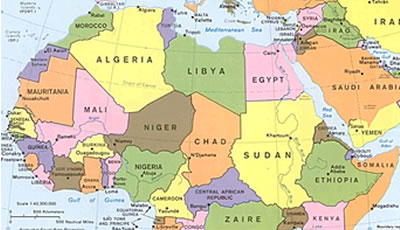
Hausa
Hausa (هَوْسَ), also known as Abakwariga, Habe, Haoussa, Hausawa, Kado, and Mgbakpa, belongs to the West Chadic branch of the Afro-Asiatic language family. It is one of the largest languages on the African continent, spoken as a first language by the original Hausa people and by people of Fula ancestry. Hausa is the majority language of much of northern Nigeria and the neighboring Republic of Niger. In addition, there is a sizable Hausa-speaking community in Sudan, dating from the British takeover of northern Nigeria at the turn of the 20th century.
There are a number of theories about the origin of the Hausa people. 
Status
Hausa is spoken by 18.5 million people in Nigeria. It is spoken as a first language by an estimated 24 million speakers and as a second or third language by an additional 15 million people across a broad band of countries of West Africa, including Benin, Burkina Faso, Cameroon, Central African Republic, Chad, Congo, Eritrea, Ghana, Niger, Sudan, and Togo (Ethnologue). It is the lingua franca for Muslim populations in much of West Africa. Every city of any size in West Africa has a large Hausa community. Hausa is used in commerce, government and the media. While higher education in northern Nigeria tends to be in English, Hausa serves as the language of instruction in primary schools. There are several Hausa language newspapers and a growing body of literature.
Dialects
Despite its wide range, Hausa has relatively limited dialect variation. Ethnologue identifies the following major dialect divisions:
- Eastern: Kano, Katagum, Hadejiya
- Western: Sokoto, Katsina, Gobirawa, Adarawa, Kebbawa, Zamfarawa
- Northern: Arewa, Arawa
There is also a pidgin or market Hausa
Standard Hausa is based on the dialect of Kano, the largest and most important Hausa-speaking city in Nigeria. It is heard on Nigerian radio and TV, and international Hausa broadcasting such as BBC Hausa, Deutsche Welle, and The Voice of America (VOA) Hausa.
Structure
Sound system
Hausa has a complex phonological system characterized by tones in addition to large inventories of vowels and consonants.
Vowels
Hausa has 10 vowel phonemes, i.e., sounds that differentiate word meaning. The vowels can be either short or long. Length makes a difference in word meaning. There are also two diphthongs /ai/ and /au/. In the table below long vowels are marked by a tilde. In the standard romanized writing system the letters i, e, a, u, o represent both short and long vowels.
| Close |
i, ī
|
u, ū
|
|
| Close-mid |
e, ē
|
o, ō
|
|
| Open |
a, ā
|
Consonants
Hausa has 32 consonants. This large inventory is due to the fact that Hausa has several unusual contrasts:
- a contrast between plain plain, palatalized and labialized velar stops, e.g., /k/ -/kʲ/ – /kʷ/, which also have ejective counterparts. Palatalized consonants are produced with the blade of the tongue coming in contact with the palate; labialized consonants are produced by rounding of the lips during the articulation of the consonant; ejective consonants are produced with the air ejected or forced out through a narrow opening in the larynx, producing a strong puff of air.
- a contrast between /b/, /d/ and their implosive counterparts /ɓ/, /ɗ/ produced with the air sucked in, rather than exhaled.
| Alveolar | Postalveolar | Velar | Glottal | |||||||
|---|---|---|---|---|---|---|---|---|---|---|
| plain | palatalized | labialized | plain | palatalized | ||||||
| Stops | voiceless |
t
|
k
|
kʲ
|
kʷ
|
ʔ
|
ʔʲ
|
|||
| ejective |
k’
|
kʲ’
|
kʷ’
|
|||||||
| voiced |
b
|
d
|
….xx |
g
|
gʲ
|
gʷ
|
||||
| implosive |
ɓ
|
ɗ
|
||||||||
| Fricatives | voiceless |
ɸ
|
s
|
ʃ
|
h
|
|||||
| voiced |
z
|
|||||||||
| Affricates | voiceless |
tʃ
|
||||||||
| ejective |
ts’
|
tʃ’
|
||||||||
| voiced |
dʒ
|
|||||||||
| Nasals |
m
|
n
|
||||||||
| Trill |
r
|
|||||||||
| Flap |
ɾ
|
|||||||||
| Lateral |
l
|
|||||||||
| Approximants |
w
|
j
|
||||||||
- /kʲ, kʲ’, k’, kʲ’, kʷ’, gʲ, gʷ/ do not have counterparts in English
- /ʔ/ = sound between the vowels in uh-oh
- /ʔʲ/ has no counterpart in English
- /ɓ, ɗ/ have no counterparts in English
- /ɸ/ has no counterpart in English
- /ʃ/ = sh in shop
- /tʃ/ = ch in chop
- /dʒ/ = j in job
- /j/ = y in yet
Syllable structure
Hausa has only three syllable types: Consonant + Vowel (CV), Consonant + Vowel + Vowel (CVV), and Consonant + Vowel + Consonant (CVC). There are no consonant clusters.
Tones
Hausa is a tonal language. Each of its five vowels may have a low or a high tone. Grave and acute accents are typically used for representing tones. However, in everyday writing, tones are not marked.
| Low tone | à, è, ì, ò, ù |
| High tone | á, é, í, ó, ú |
Click on the name of the news service to listen to news broadcasts in Hausa
Grammar
Hausa is an agglutinative language, i.e., it adds suffixes to roots for expressing grammatical relations without fusing them into one unit, as is the case in Indo-European languages.
Nouns
- Hausa nouns are marked for gender and number. Feminine nouns usually end in –a, masculine nouns end in anything but –a.
- Most Hausa nouns have plural forms. There are no simple rules for predicting the plural form. Here are some examples:
|
Masculine
|
Feminine
|
|
|---|---|---|
|
Singular
|
yaro ‘boy’
|
yarinya ‘girl’
|
|
Plural
|
yara ‘boys’
|
yanmata ‘girls’
|
Adjectives agree with nouns in gender and number, e.g.,
|
Masculine
|
Feminine
|
|
|---|---|---|
|
Singular
|
dogon yaro ‘tall boy’
|
doguwar yarinya ‘tall girl’
|
|
Plural
|
dogwayen yara ‘tall children’
|
|
Sometimes, Hausa uses nouns to modify other nouns, e.g.,
| Singular | yaro mai wayo ‘boy of strength’ |
| Plural | yara masu wayo ‘children of strength’ |
Numbers follow nouns, e.g., saniya d’aya ‘cow one’, i.e., ‘one cow’.
Verbs
- Tenses
Hausa verb tenses are differ from those in Indo-European languages in which the tense form of the verb indicates the basic time of the event, e.g., present tense indicates that the action is happening at the time of speaking, past tense indicates that the action took place before time of speaking, and the future tense indicates that the action of the verb will occur after the time of speaking. In Hausa, the tense form indicates the time of the event relative to some temporal reference. In the absence of temporal reference it is assumed that the time of reference is the moment of speaking. However, if the time of reference is in the past or the future, English must change the tense marking, whereas Hausa continues to use the same forms. English marks tense by changes in the verb form (enter/entered/ entering) and/or addition of auxiliary verbs (have, had, will, are, were, etc.). In Hausa, for the most part, the verb itself does not change to mark tense differences. Instead different sets of subject pronouns are used, sometimes with the pronoun combined with some additional particle, such as preceding za, which marks future. Here are some examples from Hausa Grammar Online:
|
English
|
Hausa
|
|
|---|---|---|
| Past (past context) |
Yesterday by 3:00 they had entered. | Jiya da karfe 3:00 sun shiga. |
| Past (future context) |
Tomorrow at 3:00 they will have entered. | Gobe da karfe 3:00 sun shiga. |
| Future (past context) |
Yesterday at 3:00 they were about to enter. | Jiya da karfe 3:00 za su shiga. |
| Future (future context) |
Tomorrow at 3:00 they will enter. | Gobe da karfe 3:00 za su shiga. |
| Present (past context) |
Yesterday at 3:00 they were entering. | Jiya da karfe 3:00 suna shiga. |
| Present (future context) |
Tomorrow at 3:00 they will be entering. | Gobe da karfe 3:00 suna shiga. |
- Hausa has no verb equivalents of to be or to have. It expresses the concept of having by using the preposition da ‘with’, e.g.,
|
Ina |
da |
kudi |
|
I |
with |
money |
|
‘I have money.’
|
||
Vocabulary
Hausa has a rich vocabulary due to numerous borrowings from other languages. One of the major sources of borrowing is Arabic that has contributed a large number of words dealing with religion (Islam), government, law, literature, science, and warfare. Arabic loanwords have been integrated into the Hausa grammatical system. Hausa has also borrowed from neighboring languages such as Mande, Tamajaq (Tuareg), and Kanuri. The most recent source of borrowing is English in Nigeria and French in Niger.
Below are a few Hausa words and phrases in Boko, a Latin-based alphabet for Hausa.
| Hello | Salam |
| Goodbye | Bankwana |
| Please | Dan Allah |
| Thank you | Na gode |
| Yes | Ii |
| No | A’a |
| Man | Namiji |
| Woman | Mace |
Below are Hausa numerals 1-10.
|
1
|
2
|
3
|
4
|
5
|
6
|
7
|
8
|
9
|
10
|
|---|---|---|---|---|---|---|---|---|---|
|
d`aya
|
biyu
|
uku
|
hud’u
|
biyar
|
shida
|
bakwai
|
takwas
|
tara
|
goma
|
Writing
Hausa is written with two different scripts.
- Ajami (‘àjàmí)
Hausa has been written with an adapted version of the Arabic script called àjàmí since the early part of the 17th century since most of the early Hausa literature was Islamic poetry or was religious in nature. Ajàmí is still used today, mainly for writing poetry. There is no standard spelling system for Hausa written with the Arabic script so there is some variation in spelling among different writers.
- Boko
In the 20th century, àjàmí was replaced by the romanized Hausa script called Boko developed in the 19th century. Today, Bookoo is the main alphabet for Hausa speakers. Boko does not mark tone. In addition to representing the glottal stop by an apostrophe, the Boko alphabet has several additional letters to represent Hausa sounds. There are some differences in Boko used in Niger and Nigeria because of different French and English orthographic conventions.
| A a | B b | C c | D d | Ɗ ɗ | E e | F f | G g | H h | I i | J j | K k | Ƙƙ |
| L l | M m | N n | O o | R r | S s | Sh sh | T t | Ts ts | U u | W w | Y y | Z z |
Language Difficulty

There is no data on how long it takes speakers of English to learn Hausa to Level S3.